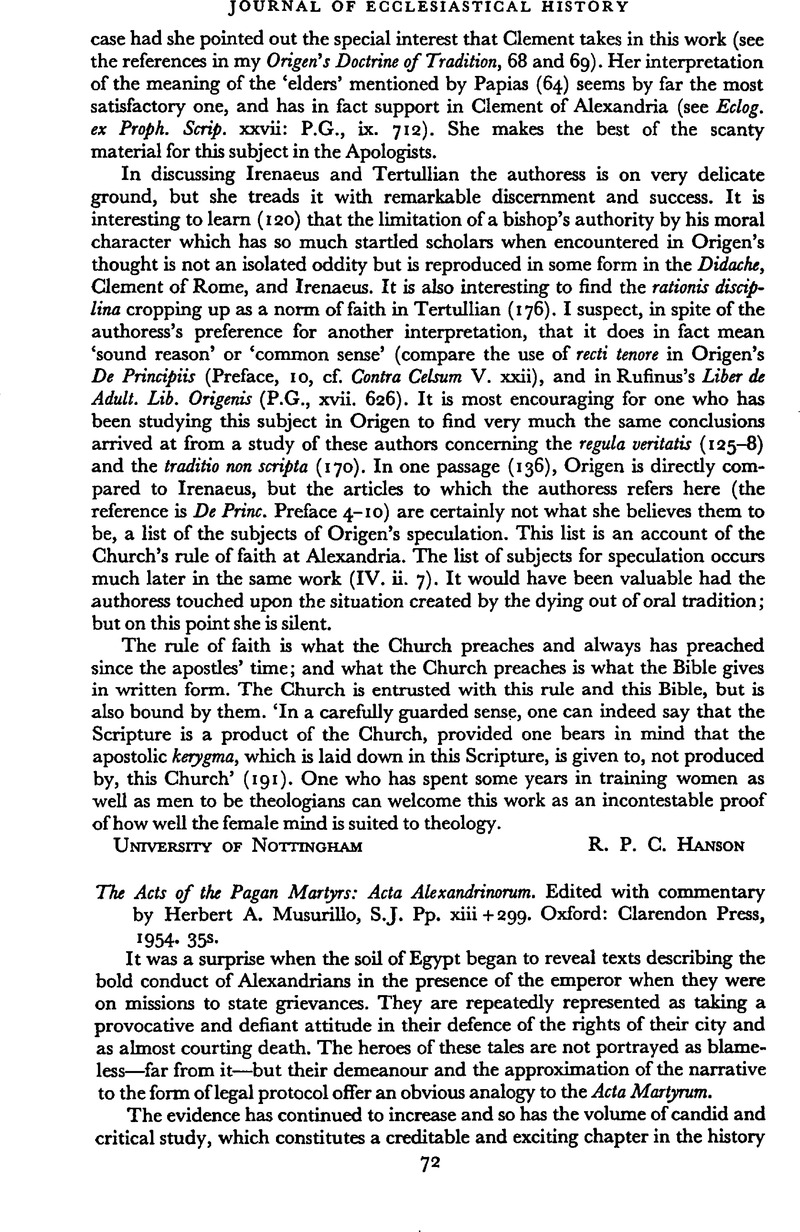No CrossRef data available.
Published online by Cambridge University Press: 25 March 2011

page 73 note 1 Thus documents printed in the book are sometimes quoted from earlier publications instead of by cross-reference.
page 73 note 2 Paulus und die Heilsgeschkhte (Acta Jutlandica, xxvi. I. Teol. Ser. 6, 1954), 321 f.Google Scholar
page 73 note 3 Cf. P. Oxy, xxii. (forthcoming).
page 73 note 4 The trial speech in P. Oxy. 472 was presumably of personal interest.
page 74 note 1 Note specially in the Acta Appiani (70), ‘as I was about to greet Death again and those who died before me, Theon and Isidorus and Lampon.’ It would be rash to suppose that there could be here some unconscious memory of Plat., Apol. 41B (on meeting earlier victims of the miscarriage of justice).
page 74 note 2 Cf. Class. Rev., LVII. (1943), 81.Google Scholar
page 74 note 3 Thus Musurillo 253 ff. discusses references to pride of birth: but cf. J. Eg. Arch., XL. (1954), 77 n. 1, adding Stob. iv. 29, p. 702 ff.Google Scholar
page 74 note 4 On 271 reference is made to the contempt of Diogenes for Sarapis; the story about this involves an anachronism (J. Hell. St., XLVIII. (1928), 21 ff.Google Scholar) but the fact that it was told is relevant. Apropos of the earlier discussion (245) of the Christian view of Socrates cf. Hanfmann, G. M. A., Harv. St. Cl. Phil., LX. (1951), 205 ff.Google Scholar
page 74 note 5 K. Holl, Ges. Aufs. z. Kirchengesch. 2, 81 drew attention to the fact that the Apologists, as contemporaries of the earliest martyr records, show a new feeling for Urkundlichkeit (to be sure, this is seen in Lk. iii. 1 and the same writer has given us in Acts xiv and xvii our earliest specimens of apologetic). The records of the deaths of martyrs in the shape of letters to other Christian communities need no explanation.
page 75 note 1 If this document be regarded as a part of the annals of Alexandrian self-assertiveness, there is no need to suppose with the editors and Deubner, L., Sitz. -Ber. Heidelberg, 1919, XVII. 11 (in an article with admirable corrections of the text) that it related to events not long before the date of copying.Google Scholar
page 75 note 2 Cf. J. Egypt. Arch., XL. (1954), 80 n. 5.Google Scholar For an earlier story of an Egyptian defying a tyrant (probably Antiochus Epiphanes: Lewis, N., Class. Phil., XLIV. (1949), 32 f.CrossRefGoogle Scholar) cf. Dio Prus., xxxii.ss 101.
I add some details. On IV, iii. 15 (p. 19) E. Meyer's reference (Urspr. u. Anf. d. Chr. iii. 543, n. 2) to Suet., Claud. 15 is useful as showing that people did make such outspoken comments to Claudius. In IV, Rec. Bii 21 (p. 23) read perhaps τ[οὐναντίον σοί γε] instead of τ[οὐναντίον σο δέ], in V, B 15 f. (p. 31) Σάρ[απις νέος]